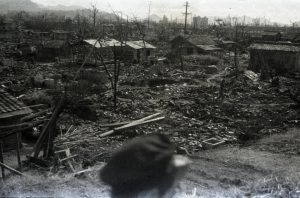My Life — Interview with Hiromu Morishita (1930–), A-bomb survivor and teacher, Part 5: Desperate escape
Apr. 23, 2022
House burned to the ground, repeated scenes of carnage
Hiromu Morishita left Hijiyama Hill for his home in Nishihakushima-cho, in Hiroshima’s Naka Ward.
I encountered a procession of soldiers on top of the hill. They were trudging along with their arms stretched out in front of them. Their tattered skin hung from their arms like rags. I finally came to realize how surreal everything was and started walking while it was still morning. As I headed down the hill, my burns began to hurt. Each time I came across a cistern with water, I soaked my towel and applied it to my body as I continued walking along. When I reached a bridge that crossed into the Hakushima area, I found it too hot to pass over. I went down to a sandbar and witnessed scenes of carnage.
I found a woman and her children in tears clinging to the body of a dead man. A woman office worker who had been carried on a stretcher from near Hiroshima Station looked to have blood pouring from her head. I also saw a military officer screaming like a madman and thrusting his sword into the ground. On the surface of the river was the pitiful sight of people who had lost all strength floating by.
Just then, a soldier arrived and told us to get out of there because the riverbanks were easy targets for machine gun fire. With that, I headed for the hills behind Hiroshima Station. I followed a crowd of people and reached a relief station, where I was treated with only Mercurochrome and oil. A soldier then instructed me to watch over a boy who had suffered severe burns over his entire back, saying, “Your injuries are minor. Take this boy with you and get away from here.” The boy told me he was a first-year student at Sotoku Junior High School.
While we were trying to get away, we suddenly saw smoke and then fierce fires arising from around the station. It was evening by the time the two of us started walking after we had waited for the fires to subside. My face was swollen and one eye was nearly closed shut, making it hard for me to see. With a great deal of trepidation, we cautiously crossed an iron railroad bridge whose ties were still smoldering.
House had burned down
There was nothing left of my house. Only a washbasin remained standing. A woman in my neighborhood called out to me, saying, “I’m sure your mother has escaped somewhere.” But all I could feel was a sense of loss.
We went straight to a relief station in the area of Yokogawa (in Hiroshima’s Nishi Ward), but there were piles of dead bodies that emitted a terrible odor. We rushed out of there as fast as we could and headed for what is now Asaminami Ward. I heard that the trains were running. As the young boy and I continued to trudge along, some people rushed out of their houses that lined the road. When they found we were not their children, their faces turned to a look of despair and they moved away from us. We finally got on a train around Furuichibashi Station. I remembered that my father’s former student was living in the Kawauchi area and got off at Midorii Station. I parted company with the boy at that point and left him on the train. I hope he survived.
(Originally published on April 23, 2022)








